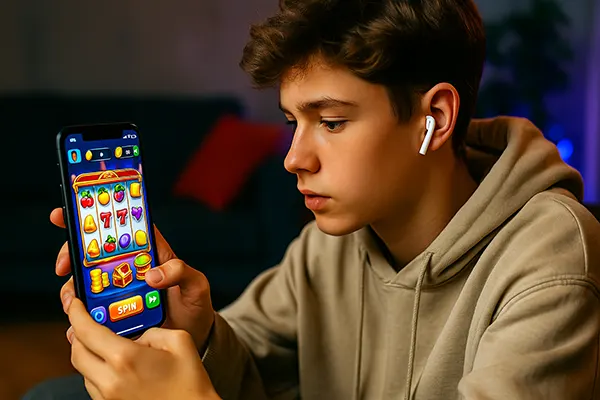Social Casinos Without Money: How TikTok Games Are Shaping the Next Generation of Gamblers

Social casinos on platforms like TikTok are reshaping the perception of gambling for millions of users, particularly Gen Z. These games mimic traditional casino experiences—slots, roulette, blackjack—but with no real-money stakes. Despite the absence of financial transactions, the influence of these games on gambling attitudes and behaviours is significant. In this article, we explore how TikTok’s algorithm-driven, entertainment-first approach contributes to the normalisation of gambling and the potential risks associated with this new trend.
The Allure of No-Stake Gaming for Younger Audiences
Social casinos have gained massive traction due to their accessibility, especially among users aged 16–24. Unlike regulated gambling, these games are readily available without the need for identity verification or age checks. TikTok’s content discovery model exposes users to flashy slot spins and big-win animations within seconds, even if they haven’t actively searched for gambling content.
Without money on the line, these games present themselves as “harmless fun,” leading to their popularity among teenagers and young adults. The gameplay is fast, colourful, and designed to keep attention through rewards, badges, and virtual currencies. This gamification encourages frequent engagement, fostering habits similar to those found in real-money gambling behaviour.
Moreover, the social validation of sharing wins or game strategies in the comments and duets reinforces a positive feedback loop. The gratification from likes and followers can closely mimic the psychological effects of monetary rewards, creating a comparable dopamine-driven cycle.
Algorithmic Exposure and Behavioural Conditioning
TikTok’s recommendation system plays a crucial role in shaping user interaction. Once a user shows interest in gaming content, the algorithm increasingly pushes similar videos to their feed. This leads to overexposure and behavioural conditioning, subtly nurturing a fascination with casino mechanics and symbols—even in the absence of monetary stakes.
Studies in behavioural psychology suggest that repeated exposure to stimuli resembling gambling reinforces patterns of risk-taking and reward-seeking. The colourful reels, suspenseful sound effects, and rapid gameplay promote compulsive engagement, particularly among users who may later transition to real-money gambling as adults.
Unlike YouTube or Facebook, TikTok’s vertical short-form video model amplifies the impact by delivering content in rapid, bite-sized doses. This method is especially potent for adolescent users whose decision-making faculties are still in development and more susceptible to behavioural influence.
Real-World Implications and Regulatory Oversight
Although social casinos do not involve actual financial risk, experts argue they could serve as a gateway to future gambling habits. The UK Gambling Commission has raised concerns about gambling-like features in social media games, especially those targeting minors. As of early 2025, no binding regulation specifically addresses TikTok social casinos, but advocacy groups are calling for urgent action.
Psychologists warn that repeated exposure to gambling-style games during adolescence may lower the perceived risks of real gambling. When these individuals later encounter real casinos—online or offline—they may be more likely to engage impulsively, believing they understand the mechanics or can win easily.
Additionally, developers and influencers often blur the lines between entertainment and marketing. Some promote legitimate gambling apps through TikTok live streams or hidden links, circumventing advertising rules. This raises ethical questions about consent, transparency, and digital responsibility in youth-targeted content.
Calls for Platform Responsibility
Campaigners urge platforms like TikTok to implement stricter age-gating and clearer labelling of gambling-style content. Transparency is lacking—many social casino games appear under generic hashtags like #gameplay or #funnyvideos, making them difficult for regulators and guardians to track or filter.
One proposed solution is the introduction of mandatory content warnings for any video featuring simulated gambling mechanics. Such labels could act as deterrents or at least enable parents to monitor what their children are exposed to more effectively.
There is also momentum building within the European Union to apply existing consumer protection laws to social casino games. While TikTok maintains that their community guidelines prohibit gambling-related harm, enforcement remains inconsistent and largely reliant on manual reporting mechanisms.

Future Outlook: Gamification and Gambling Convergence
As of February 2025, we’re witnessing a convergence between entertainment, gamification, and gambling. Social casino games are a testbed for future monetisation strategies, with in-app purchases of cosmetic upgrades and power-ups already common. Although not currently linked to cash winnings, these features replicate slot machine mechanics and psychology.
Major gambling operators are also monitoring this space, exploring partnerships with social media influencers to reach younger demographics. This cross-promotion introduces gambling to users at an earlier stage than ever before, effectively embedding betting-related themes into daily online experiences.
Without timely intervention, the lines between entertainment and gambling may become indistinguishable. If young users are conditioned to associate gambling mechanics with positive emotions, they may be more vulnerable to compulsive gambling behaviour later in life—particularly when real money becomes part of the equation.
Educating and Protecting the Next Generation
Experts advocate for early education about gambling risks in schools and digital literacy programmes. Rather than solely focusing on banning content, they argue for equipping youth with the tools to recognise manipulative design and emotional triggers in digital games.
Parents, educators, and content creators all play a role in shaping a healthier online environment. Collaborative campaigns can help reinforce critical thinking and self-awareness when engaging with game-like content on platforms such as TikTok.
Ultimately, addressing this issue requires both cultural and regulatory shifts. While social casinos might seem harmless now, they represent a rapidly evolving frontier where gaming and gambling meet—and the implications for young users are too significant to ignore.




